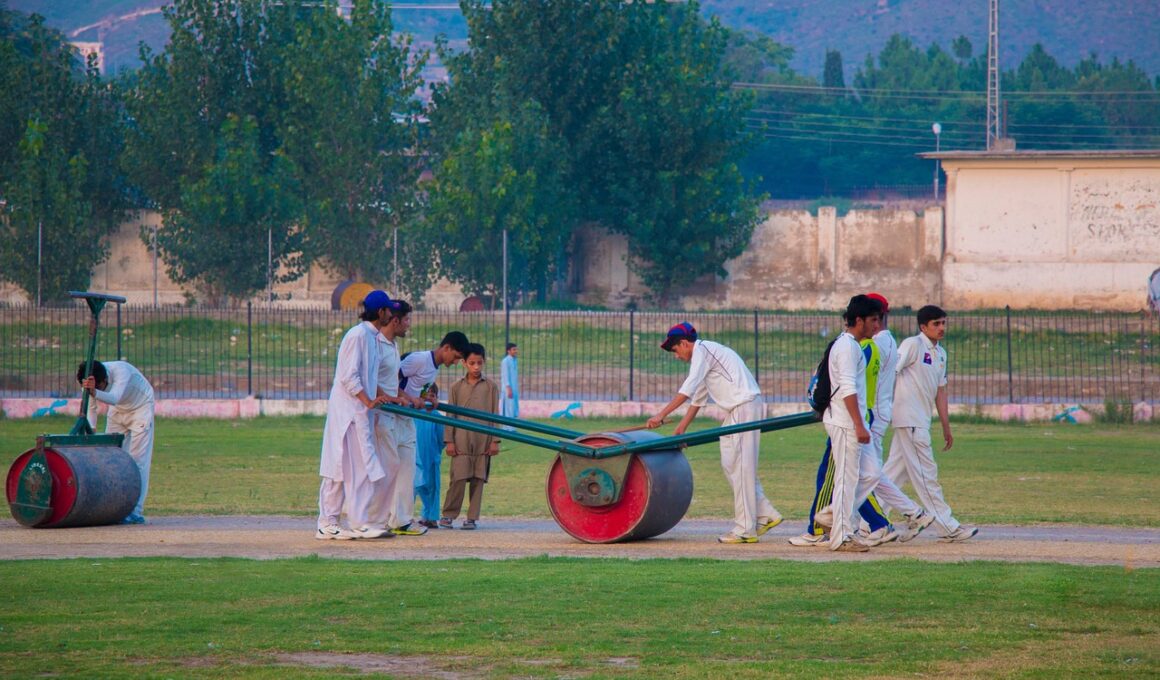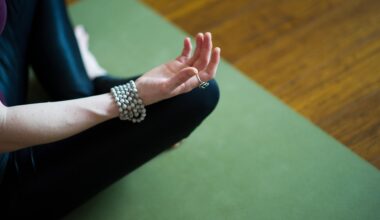Tracking Progress in Group Functional Fitness Programs
Tracking progress in Group Functional Fitness Programs is essential for participants to recognize their advancements. Understanding progress fosters motivation and accountability, integral components of a successful fitness journey. Implementing tracking methods enables participants to identify their strengths, weaknesses, and overall fitness improvements over time. One effective method is to utilize performance metrics, such as time, repetitions, and weight lifted, to gauge progress. This quantitative approach offers numerical insights that are tangible and motivating. Additionally, keeping a fitness journal can provide valuable reflections on each workout. Participants can record emotions, energy levels, and specific exercises completed, aiding in personal accountability. Regular assessments such as benchmark workouts or skill tests also contribute effectively. They allow individuals to measure improvements periodically, making the results clearer. Together, this combination of techniques ensures that everyone can visualize their growth and prioritize their goals in group classes. Setting achievable milestones along the way is also crucial as it keeps participants engaged and striving toward those next objectives in their fitness journey. Ultimately, the more aware participants are of their progress, the more likely they are to stay committed to their fitness goals.
Moreover, it is equally important to encourage peer accountability during these group functional fitness classes. Participants can engage in supportive partnerships or small teams for regular check-ins about their progress. Having workout buddies not only enhances motivation but also creates a community that celebrates achievements and pushes one another during challenging workouts. Establishing a tracking system within the class can add an extra incentive. For example, the use of a leaderboard may spark a friendly competition, driving members to improve their results. But beyond competition, sharing progress openly can foster respect and camaraderie among participants. Moreover, digital tools like fitness apps can significantly enhance the tracking experience. These platforms allow users to monitor workouts, track nutrition, and share results with their fitness community. Social media can also serve as an informal tracking tool where personal achievements can be celebrated among peers. Engaging in discussions or sharing milestones on online forums or through group apps creates a forum for sharing best practices and tips that elevate every member’s performance in the class setting.
Aside from tracking physical achievements, mental progress should not be overlooked in group functional fitness programs. One’s mindset often significantly impacts performance and engagement levels. Mindfulness practices, such as self-reflection or meditation before or after workouts, can enhance focus and reduce anxiety. By evaluating their mental state, participants can prioritize their emotional health alongside their physical achievements. This comprehensive approach to tracking, which includes mental fitness, can lead to improved overall well-being. Journaling not only physical metrics but also emotional experiences helps individuals assess their feelings and attitudes toward fitness. Also, establishing a routine evaluation period allows members to analyze fluctuations in mood, energy, and commitment levels. This awareness can lead to well-informed adjustments in workout frequency or intensity, contributing to a balanced lifestyle. In group settings especially, sharing these insights can cultivate a supportive network where vulnerability is met with encouragement. Participants should feel empowered to express their needs; facilitating a culture of open discussion regarding mental health ensures a holistic approach to fitness in this communal environment.
Measuring Success in Functional Fitness
Different individuals possess unique goals within functional fitness classes, emphasizing the need for personalized tracking methods. It is essential to map individual objectives whether participants aim for improved strength, endurance, or flexibility. Defining these clear, measurable goals allows individuals to tailor their efforts appropriately. Communication with trainers about personal benchmarks encourages tailored programming during sessions. They can help identify relevant metrics to track, ensuring that progress assessments align with each person’s aspirations. Group classes inherently promote a supportive atmosphere where personal success is celebrated collectively. Therefore, documenting progress not only offers personal insights but also fosters a sense of community achievement. Progress can be celebrated by organizing end-of-challenge events where members showcase their advancements. This communal celebration can include a mix of metrics, including not only athletic performance but also visible transformations and stride variations. Activities where members can share their experiences motivate others who may be struggling. Regularly reflecting on each person’s journey towards their goals ensures that group members remain committed to their respective paths within these classes, transforming challenges into collaborative victories.
In navigating the tracking process, members must also be aware of potential barriers that may impact their progress. Factors such as injuries, pressure, or even unanticipated life events can interfere with regular participation. Thus, acknowledging these challenges is vital to maintaining motivation and commitment. It’s essential for participants to remain flexible in their tracking methods. Adapting goals when obstacles arise ensures progress doesn’t become stagnant. Keeping an open dialogue with trainers or group leaders fosters a supportive environment where adjustments can be made without fear of judgment. This adaptability also extends to incorporating recovery methods into one’s fitness regime. Understanding the importance of rest days and recovery practices can prevent burnout and encourage longevity in fitness participation. Celebrating even small victories, like consistency in attendance or dedicated effort during workouts, reinforces positive reinforcement. In doing so, members continuously strive toward their goals while remaining cognizant of their physical and emotional well-being. This comprehensive tracking not only enhances individual progress but ultimately strengthens the group dynamic for fitness success.
Furthermore, educating participants about nutrition and its impact on progress is critical in group functional fitness classes. Nutrition is integral to achieving fitness-related goals and maintaining energy levels during workouts. Including expert-led discussions on nutrition within the program can empower participants to make informed choices about their diet. Accordingly, regular nutritional check-ins can provide crucial insights into participants’ eating habits, ensuring they remain aligned with their fitness goals. This aspect of tracking leads to a more holistic approach, effectively intertwining physical training with proper nutrition. Participants can share successful recipes or meal-prepping tips, fostering camaraderie amongst group members focused on improving their dietary habits. Recognizing that fitness transcends the gym can motivate participants to track dietary changes as well. Tools like food diaries can provide insights into eating patterns and habits. Thus, creating a culture of shared knowledge regarding proper nutrition will empower every group member to take charge of their dietary choices while simultaneously helping to reach overall fitness goals. Healthy choices should create a strong foundation for everyone’s fitness efforts.
Lastly, celebrating milestones throughout the journey of progress tracking in group functional fitness programs is fundamental. Acknowledging not only the big accomplishments but also the small wins reinforces motivation and commitment among participants. Whether it’s reaching a personal best in a workout or sticking to a new nutrition plan, moments of celebration build a stronger community focused on collective achievements. Setting up monthly recognition events can offer an excellent platform for individuals to share their stories and challenges faced during their fitness journeys. These events can include awards or simple shout-outs that encourage members to reflect on their improvements. Further, documenting these milestones encourages participants to recognize their growth over time visually. Social media groups may serve as a useful space for participants to post about their accomplishments and share progress updates. In conclusion, recognizing both individual and group successes fosters unity within fitness programs and inspires every participant to continue engaging actively in their fitness journeys. By creating an environment where achievements are celebrated, instructors foster resilience, determination, and an unyielding commitment to overall health.
In adopting a philosophical view of every aspect of fitness, the participants realize it is not solely about isolated workouts. Tracking progress requires a mindset of continuous improvement that can be applied to various facets of life. Participants in functional fitness classes can seek to nurture a consistent habit of self-reflection and acknowledgment, which will serve them well beyond the gym. The camaraderie developed within these classes amplifies the benefits of shared experiences during workouts. As individuals embrace their journeys, they contribute to the entire atmosphere of support and motivation. This collective experience builds deeper, more trusting relationships among members while fostering a positive fitness environment. Finally, this includes recognizing the importance of self-care in conjunction with physical activities—embracing aspects such as nutrition, rest, and mental health. Establishing a well-rounded approach ensures that participants place value across multiple dimensions of their health. In summary, the essence of tracking progress in group functional fitness programs is not just numerical data. It encompasses personal growth and a sense of belonging among like-minded individuals determined to achieve their best selves through fitness and community.


